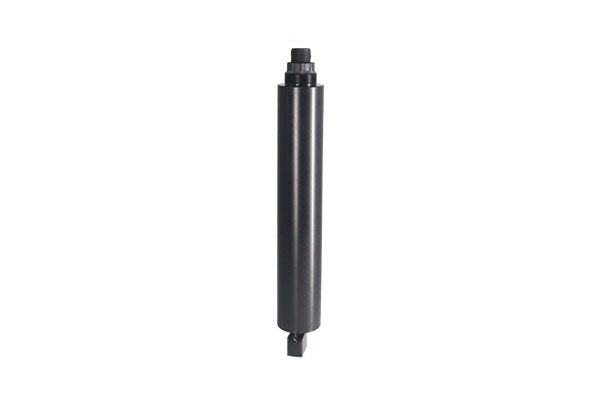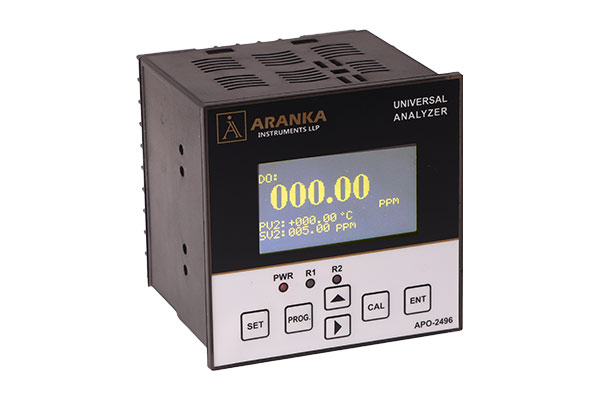

TSS Analyzer Manufacturer
We are a trusted TSS (Total Suspended Solids) Analyzer manufacturer and supplier based in Ahmedabad, Gujarat, offering advanced optical sensors designed for precise measurement of suspended particles in water. Our analyzers operate on the light scattering principle, where suspended solids in a liquid sample scatter an infrared light beam. The intensity of this scattered light is measured by the sensor and converted into a real-time concentration of suspended solids, making it ideal for wastewater treatment, industrial effluent monitoring, and process control applications.
The AIDSS 450 & AIDSS 451 TSS Sensors use a 135° backscatter detection principle with an 880 nm infrared LED light source and a unique adaptive algorithm that minimizes external light interference. Built with an optical fiber structure, these analyzers provide high repeatability, excellent stability, and minimal drift. The automatic cleaning brush effectively removes bubbles and contamination, ensuring long maintenance cycles and consistent long-term performance even in challenging water conditions.
- Digital sensor, RS-485 output, support MODBUS
- With automatic cleaning brush to prevent contamination and eliminate air bubbles
- Compensate for water color to eliminate interference with color measurement
- Fiber-optic structure, independent of ambient light
| Power Supply | 100 ~260 VAC @ 50Hz OR 24VDC | |
| Measuring Range | 0.5 ~5000mg/l | |
| Resolution | 0.1 mg/l | |
| Response Time | 4 SEC | |
| Accuracy | <3% | |
| Protection Level | IP 68 | |
| Analogue output | 4-20mA | |
| Communication Output | RS 485 Modbus RTU | |
| Process Connections | DIN, ANSI Flanges, Tri-Clamp | |
| Display | OLED LCD | |
| Digital output | 2 nos. Relay 3A 1CO | |
| Enclosure Size | 96x96x85 mm | |
| Cutout Size | 92x92mm | |
| Enclosure Body | ABS, Flame Proof Aluminum [Optional] | |
| Operation Temperature | 0-50’C | |
-
Municipal Wastewater:
TSS sensors are crucial in monitoring and controlling wastewater treatment plants. They help optimize aeration basins, monitor turbidity at the outlet, and ensure efficient treatment processes.
-
Industrial Wastewater:
Industries use TSS sensors to monitor and control their wastewater discharge, ensuring compliance with environmental regulations and optimizing treatment processes.
-
Sludge Treatment:
TSS sensors play a role in sludge treatment, ensuring efficiency and proper processing.
-
Water Quality Assessment:TSS sensors are used to monitor water quality in rivers, lakes, and other water bodies. They help researchers study the impacts of suspended solids on aquatic ecosystems and track sediment transport.
-
Erosion and Sedimentation Studies:
TSS sensors provide valuable data for understanding erosion and sedimentation patterns in various environments.
-
Beverage Production:
TSS sensors help optimize cleaning processes (SIP/CIP) and improve separation and filter processes in the food and beverage industry.
-
Other Process Water Applications:
They are used in various industrial processes where monitoring suspended solids is important for quality control and process optimization.
- Aquatic Organism Health: TSS sensors help monitor and manage suspended solids levels, ensuring a healthy environment for fish and other aquatic organisms.
- Dredging Sites: TSS sensors provide essential environmental data at dredging sites.
- Stormwater Management: They can be used to monitor TSS levels in stormwater runoff.
- Drinking Water Treatment: TSS sensors can be used in drinking water treatment plants to ensure water quality.
Frequently Asked Questions (FAQs)
What is a TSS Analyzer?
A TSS (Total Suspended Solids) Analyzer measures the concentration of suspended particles in water by analyzing how light is scattered by those particles.
How does the TSS Analyzer work (working principle)?
The analyzer uses optical backscatter: an infrared light source is passed through the water, particles scatter the light, and the sensor detects the scattered intensity (e.g. at 135°) to compute the solids concentration.
What are the AIDSS 450 / AIDSS 451 sensors?
These are specialized optical sensors using 880 nm infrared LED light and 135° backscatter detection, with adaptive algorithms to filter out external light interference and enhance measurement stability.
What is the role of the automatic cleaning brush?
The automatic cleaning brush helps remove bubbles, fouling, and contamination on the sensor window, reducing measurement errors and extending maintenance intervals.
What is the measuring range and sensitivity?
The precise range depends on the model; common ranges can go up to several thousand mg/L of suspended solids. (Exact model specifications should be checked.)
In what applications is the TSS Analyzer used?
Common applications include wastewater treatment, industrial effluent monitoring, sedimentation control, filtration systems, and process water / environmental monitoring.

